Growing up deeply enmeshed in Jewish institutions and Jewish education (read more about that here), I would learn about the story in the first book of the Torah, Beresheet (Genesis: 18 for you gentiles out there). In this story, Abraham and Sarah are visited by three strangers who come to their tent. Unbeknownst to Abraham until much later, these three men are actually angles sent from G-d. Assuming they aree just three regular wanderers in the desert, Abraham quickly invites them in to his tent and out of the harsh desert climate.
I learned that Abraham ushered these men to sit down and said he would go get them some water. He did get them water, both to drink and soak their feet with, but he also did much more for them. He told his wife (classic man eh) to slaughter a goat for them and also brought them other things to comfort them on their long desert journey. Abraham did all this before even asking the names of these men or why they were at him home. Because of Abraham’s generosity to these strangers, they later revealed who they were and granted Sarah childbearing abilities. The moral of this parasha has stuck with me far after Hebrew school ended: actions will always speak louder than words.
Growing up studying the Torah portion every single week, I spent a lot of time imagining what it must have been like for my forefathers and foremothers to live in a remote desert and use donkeys and camels for transportation. These biblical recreations in my head were based mostly on Disney movies like Aladdin and other Orientalist discourses about the deserts of the SWANA region (also known as the Middle East). That is, until I visited Palestine and witnessed my first real image of what it is like to live in a desert. Of course, not all of Palestine is desert, but coming from Toronto, even lush places like the Jordan Valley and Masafer Yatta feel like a desert to me.
Me posing next to the wall of a tent that used an Israeli advertisement banner as reinforcement
A longtime activist and host of ajaneb like myself in Masafer Yatta once told my group about desert/tent etiquette. He told us that when someone comes to visit your tent, it is your obligation to invite them in. Not only should you bring them in from the sun, but you must feed them and provide them water and a place to rest. Only after you have hosted them for over a week, is it appropriate to ask them what they are doing here. My comrades and I laughed and marvelled at this story. I explained that even in Canada, people don’t typically invite strangers in when they show up on our doorstep. And if we do, our first questions are who the hell are you and why are you here?
Ali and his camel
During my time in Palestine, I read over ten books of both fiction and nonfiction by Palestinian authors. Some of these books depicted Palestine before, during, and shortly after the 1948 Nakba. I read about how during the 30’s and 40’s, strange Jews just began to appear in people’s villages and in front of their homes. With this same dedication to hospitality, these interlopers were welcomed and provided for. Later, it was many of these same Jews who slaughtered those who had welcomed them in the name of a Jewish state. These stories reminded me far more of the colonial actions of the Pilgrims when they first came to America than any tenet of Jewish values or morals.
The activist who tells us this also likes to remind us that he is an 8th generation descendant of Jews. That before the State of Israel, Jews, Muslims and Christians lived in the land inconsequentially, often trading and even intermarrying. This is what occurred in his family long ago in the land we stand on now. Over those eight plus generations, his family has moved from caves to tents to buildings, but has continued to live and work the land. On good days, he likes to joke that his heritage makes him Jewish and gives him the same entitlements as the settlers on this land: security, divinity, and firearms. But good days seem to be fewer and further in between.
Growing up, this young man was forced to walk to school with an army presence so as to make it through unharmed when he entered the Jewish-only settlement cutting off his village from the neighbouring village. Often, the army did little to prevent slurs and rocks hurled at these children by the Jewish settlers. So, international activists would also accompany him and his peers to school and back. These days, it is far too dangerous for the children to walk through the settlement and they must be driven. Unfortunately, the car that takes them has been burned by settlers.
Today, this same phenomenon occurs in many villages in Masafer Yatta. Four days a week in the village I stayed in (the PA is too broke to pay for a full schoolweek), international activists join the elementary and middle school children at 6:30 for the kilometre long walk to school, and again around 1pm for the journey back. Most days, the journey is settler-free. However, in my three months in the region, I had several occasions where settlers, often teenagers themselves, blocked and intimidated the children on their way home from school.
Using my body or a car to keep a safe distance between these ‘hilltop youth’ and the Palestinian schoolchildren, I watched as dirty, brainwashed teenagers in kippot and tallit katan cursed and terrorized these small children. These acts, which occur daily and towards everyone from toddlers to seniors, are undertaken not out of cruelty, but out of piety. These young boys truly believe that ridding the Jewish homeland of its Arab savages is the holiest act they can perform. I wonder to myself how both me and these boys can have studied the Torah, but come away with completely different directives. I wonder if they think of Abraham’s generosity as they invade and destroy the homes of their Palestinian neighbours.
In many ways, I have far more in common with these settlers than I do with the Palestinians who host me. We share the same religion, language, upbringing, and core beliefs. We have modelled much of our lives based on what our faith tells us. And yet, I want nothing to do with these people. I feel a deep urge to plead with the Palestinians and explain to them that these are not my people. That this is not my faith. That these people are not Jews like me. Of course, the Palestinians do not need to experience my identity crisis on top of everything else, so I remain quiet.
In all of the places I have been in the Arab world, it is only me who has a problem with the Jews. Me who cannot seem to separate the settlers and soldiers destroying Palestine from the nice people with shofars occupying the US capitol and showing up at protests in droves. In Masafer Yatta, it mattered little to the activists who hosted us that I shared the same religion as those who relentlessly terrorized them. Trained to spot a Jew, almost as if their lives depended on it, my religion was never a secret. As I was ushered into homes and handed cups of tea, I was not asked to explain how my people could have gone so far astray. Handed meals to eat or babies to hold, I was never asked why my cousins couldn’t see the humanity of the people I sat next to.
In Masafer Yatta, I occasionally made jokes about the Jewish or Israeli activists being settlers. These jokes were always met by chastisement from the villagers. We don’t care who you are or what your religion is, if you are here to help us then we are friends in struggle. In my travels in Jordan and Egypt, I met many Palestinians who were deeply confused by my presence and ability to speak Arabic. But why? they would all ask me. Finally in Arabic, I would explain that I was a Jewish peace activist. Ohhh! they would remark. Finally, they could place me and make sense of this strange ajaneb.
Without missing a beat, every single person responded with indifference or reassurance. Everyone responded with some form of the following: we are all human, there is no difference between us. Would this response have been the same if I was wearing an IDF shirt? Probably not. But to see the humanity in others, allows them to see the humanity in us. In Egypt I met with survivors and refugees from Gaza that I have been fundraising for (PLEASE DONATE!).
All of them sit in Egypt, unable to work or attend school, and think about the spouses and siblings and parents that are still in Gaza. They feel immense despair. They wonder why the world allows this to continue. But they also invite me into their homes for meals. Offer me coffee and thank me for my support both from abroad and in coming to visit them. They too know I am Jewish. As I approach them in person for the first time, I feel the weight of all that is being done to them in my name. But as we meet, this guilt and shame melts away momentarily.
During my time in Masafer Yatta, I did many interviews and presentations about the situation there. The one I was most nervous about was of course the podcast I did with a diasporic Palestinian woman. Here I was, Zooming in from my illegitimate place in her homeland as she sat abroad, unable to stand where I was. But yet again, the guilt was only mine. She held no ill will towards me for my unjust privilege being flaunted in her face. I emphasized in our chat the same thing I seem to emphasize often on my social media and in this blog: the immense hospitality and warmth of Palestinians. My Palestinian counterpart responded to me by acknowledging the importance of hospitality and welcoming in Palestinian culture.
I understand and respect that not all Palestinians feel this way. Frankly, I’m surprised more don’t. Though my intent is good, my work leverages and thereby perpetuates my unearned privilege. The mere idea that I should have something to say on about a land I have no relationship with is in itself a perpetuation of white and Jewish supremacy. I don’t think I would have the patience to be friends with myself if I was a diasporic Palestinian.
me and the coolest girls in Palestine
My last night we were all given plaques as thanks in a ceremony
When visiting with a Palestinian friend in Jordan, she told me I had done something very Palestinian the night before, when, unprompted and without asking, I heaped food on her empty plate and insisted she eat it. I laughed when she pointed this out and recounted to her the many times I sat in someone’s house in Masafer Yatta, belly full, as food is heaped onto my plate and I’m being told “Kulshi! Kulshi!” (meaning: everything). We laugh at this briefly before I again think about my people’s actions in Palestine.
Jews also once had a strong culture of hospitality. Like Abraham in the desert or the folks in Masafer Yatta, we too were once known for ushering people inside and insisting on feeding them. The classic Ashkenazi trope in North America of my childhood was that of the Jewish mother who would usher in all of her loved ones and acquaintances, insisting they were too skinny and were in need of a good meal.
Today, as those who claim to be part of a Jewish state starve over a million people willfully and with glee, I know that my Jewish referents have been forever changed. How can I look at a Jewish star and see anything but the way it has been branded on Palestinians or displayed over ethnically cleansed land. The Jewish holiday of Passover, which I was invited to celebrate in a Palestinian home in a Palestinian village with Palestinians, Internationals, and Israelis marks the time that the Jewish people we freed from bondage. The text we read begins with the proclamation to let all who are hungry come eat.
As I return to Canada, I feel sick. I wonder how one single Jewish institution and one single retired rabbi have spoken publicly against what is happening in Gaza. I wonder how it could possibly be that the hearts of my people have become so hardened that we have become the very same oppressors we have always feared most. I wonder how those who grew up like me, learning like me that Judaism’s greatest value is pikuach nefesh, or preservation of life can support Israel. Maybe they don’t and are just silent. But I can’t understand this either. How can we idly stand by as so much death and destruction is occurring in the name of combatting antisemitism? How can anyone see what is happening and turn their back?
The day after I returned, I thought that I should get on a plane and go back. How could I possibly just be here in Canada doing nothing and living my life as though people are not dying? I’ve talked myself off the ledge, but I’ve also resolved to do more. To understand how much every single voice matters. How much of a difference every single dollar we donate makes . To feel sane in a maddening world is worrisome to me. I feel glad I can’t just hit the mall now that I’m back. But, I know that despair and shame are not the emotions that propel our movement forward. Yesterday a movement mentor of mine quipped that who are we to give up hope and stop trying when the Palestinians who are experiencing unimaginable atrocities right now refuse to give up.
It rolled off her tongue so simply, but struck me so profoundly. Let us open our hearts and our tents and continue to build the world we wish to see. After all, wouldn’t not trying at all be even more disparaging?

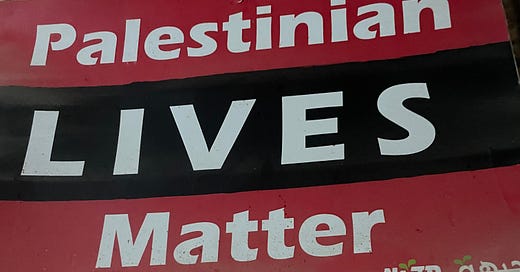


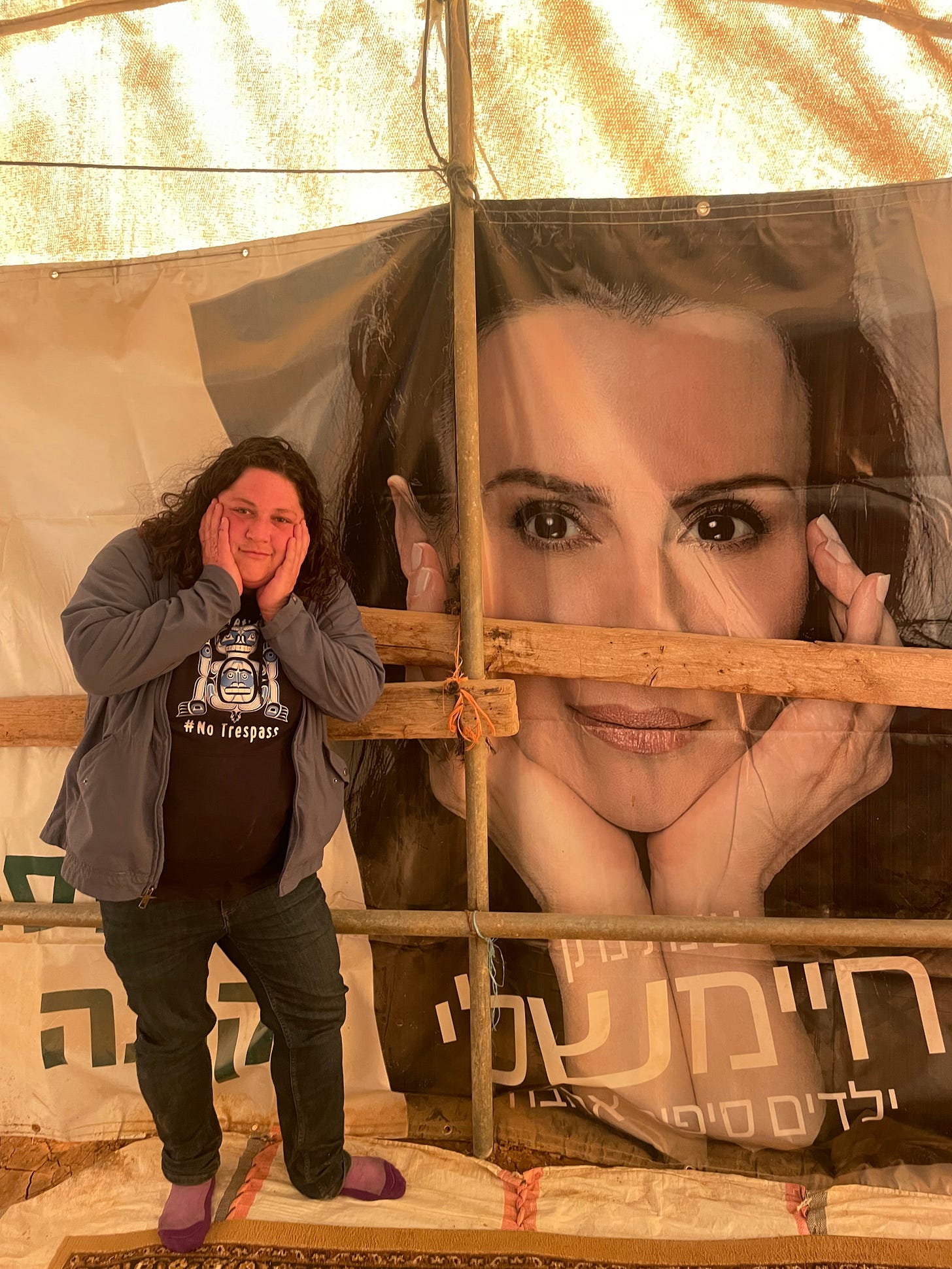
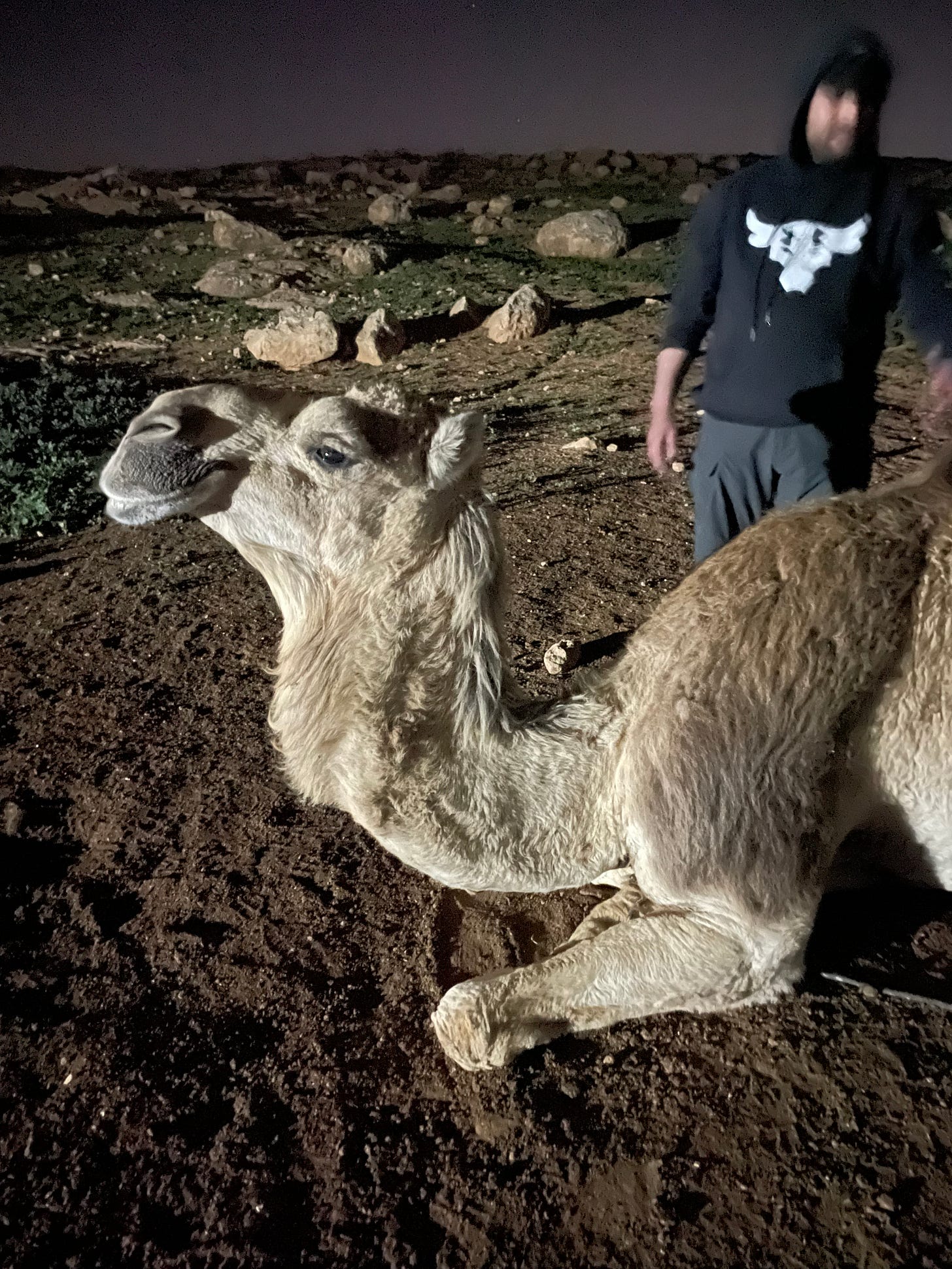
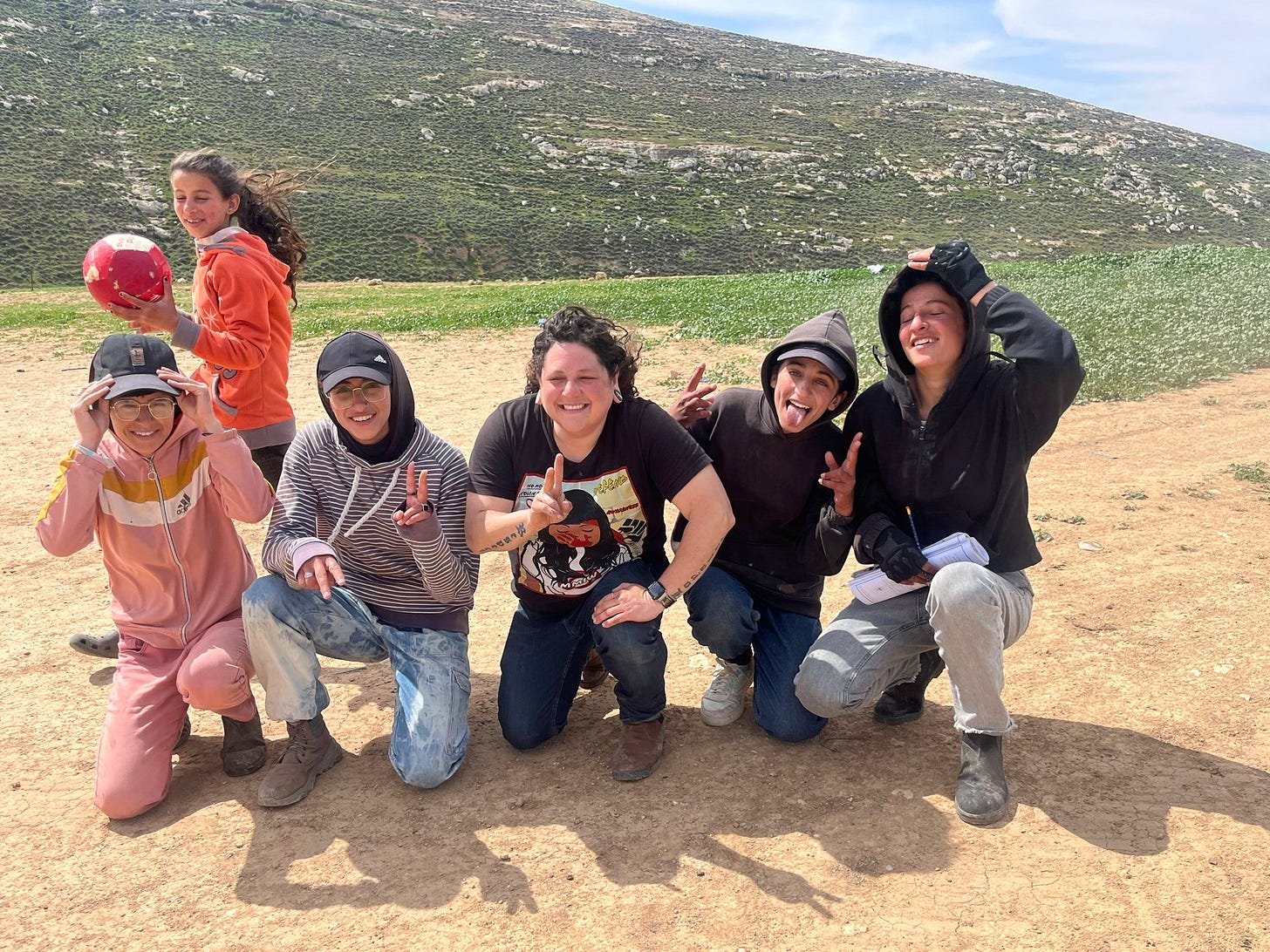
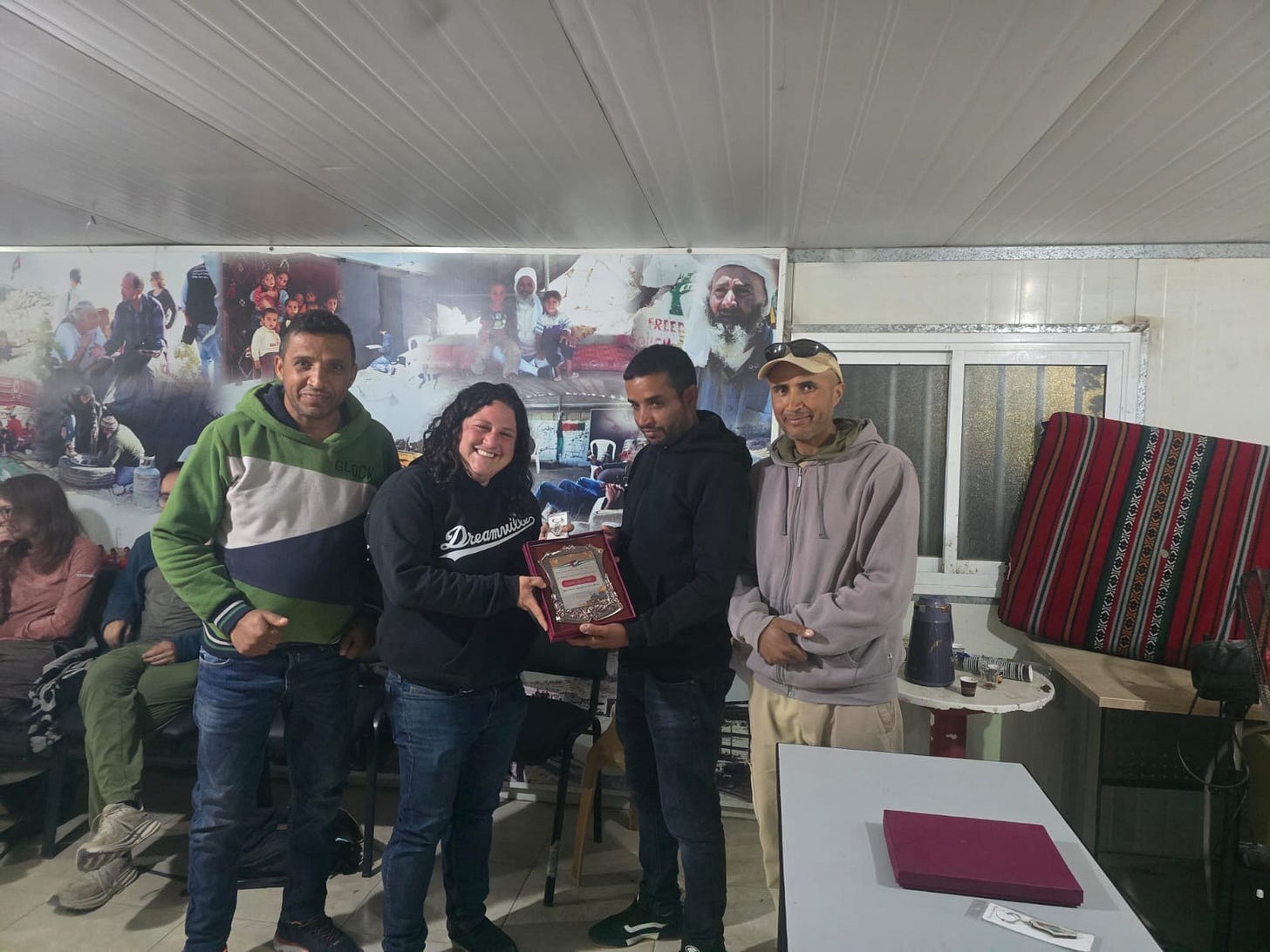
There is great comfort to be found in reading the following article published May 14 (chock full of positive findings):
https://thecjn.ca/news/half-of-american-jewish-voters-believe-trump-is-antisemitic-poll-finds/
THE CANADIAN JEWISH NEWS
Half of American Jewish voters believe Trump is antisemitic, poll finds
About 60 percent of respondents also have unfavourable views of Israeli PM Benjamin Netanyahu.
Grace Gilson, JTA
May 14, 2025
(JTA) — About half of American Jews describe U.S. President Donald Trump as antisemitic, while only a minority think his campus crackdown is reducing antisemitism, according to a new survey. American Jews are also broadly critical of Israeli Prime Minister Benjamin Netanyahu, and fewer of them say they feel an attachment to Israel than before the current Israel-Hamas war, according to the survey. [...]
_____________